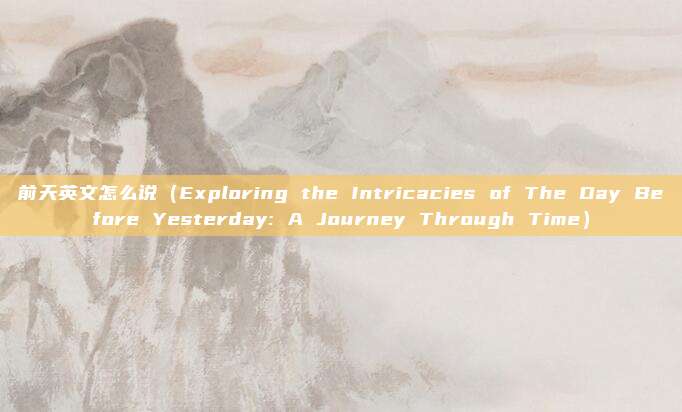前天英文怎么说(Exploring the Intricacies of The Day Before Yesterday: A Journey Through Time)
温馨提示:这篇文章已超过270天没有更新,请注意相关的内容是否还可用!
In the ever-evolving tapestry of human language, certain phrases hold a unique charm and depth. One such phrase is "the day before yesterday," which, while seemingly simple, carries with it a sense of nostalgia and reflection. In this article, we delve into the meaning and usage of this time-related expression, offering insights into its linguistic roots and exploring its significance in everyday conversations.
The Linguistic Roots of "The Day Before Yesterday"
The phrase "the day before yesterday" is a straightforward translation of the English language's method of expressing past time. It is derived from the combination of "the day" and "before yesterday," which together convey the idea of a specific day that occurred two days prior to the current date. This expression is widely used in English-speaking countries and is particularly popular in contexts where precise temporal references are needed.
Usage in Conversations

In daily discourse, "the day before yesterday" serves as a means to provide a clear and concise reference to a past event. It is often employed in situations where the exact date is not immediately relevant but the recollection of an occurrence is crucial. Here are a few examples of how this phrase might be used in different scenarios:
1、Personal Reminiscence: "I remember the day before yesterday when we had that amazing picnic at the park. The weather was perfect, and the food was delicious."
2、Professional Communication: "I was going through the reports from the day before yesterday. There seems to be an issue with the data that needs to be addressed immediately."
3、Educational Context: "Let's discuss the events of the day before yesterday in history class. It was a pivotal moment that marked the beginning of a new era."
The Timeless Nature of "The Day Before Yesterday"
The phrase "the day before yesterday" is timeless in its application. It transcends the boundaries of time, as it is equally relevant today as it was centuries ago. This is due to the inherent flexibility of the English language, which allows for the expression of time in various forms and styles. The phrase also reflects the human tendency to look back and reflect on the past, an activity that is as ancient as the practice of storytelling itself.
SEO-Friendly Tips for Using "The Day Before Yesterday"
For those who are looking to optimize their content for search engines while incorporating the phrase "the day before yesterday," here are some SEO-friendly tips:
1、Keyword Optimization: Ensure that "the day before yesterday" is used naturally within the text. Overuse can be seen as keyword stuffing, which is penalized by search engines.
2、Contextual Relevance: Use the phrase in a context that makes sense. For instance, discussing historical events or personal experiences will naturally include references to past dates.
3、Meta Tags: Incorporate the phrase into the meta title and description to improve the click-through rate from search engine results pages.
4、Internal and External Links: Include links to related content that also use the phrase, as well as external links to authoritative sources that discuss the phrase in a similar context.
5、Engaging Content: Write content that is informative and engaging, as high-quality content is favored by search engines.
In conclusion, "the day before yesterday" is more than just a phrase; it is a window into the past, a way to anchor memories, and a tool for precise communication. By understanding its linguistic roots and exploring its usage, we can appreciate the richness of language and its ability to convey both the simplest and most complex of thoughts.
网站文章、图片来源于网络,以不营利的目的分享经验知识,版权归原作者所有。如有侵权请联系删除!





还没有评论,来说两句吧...